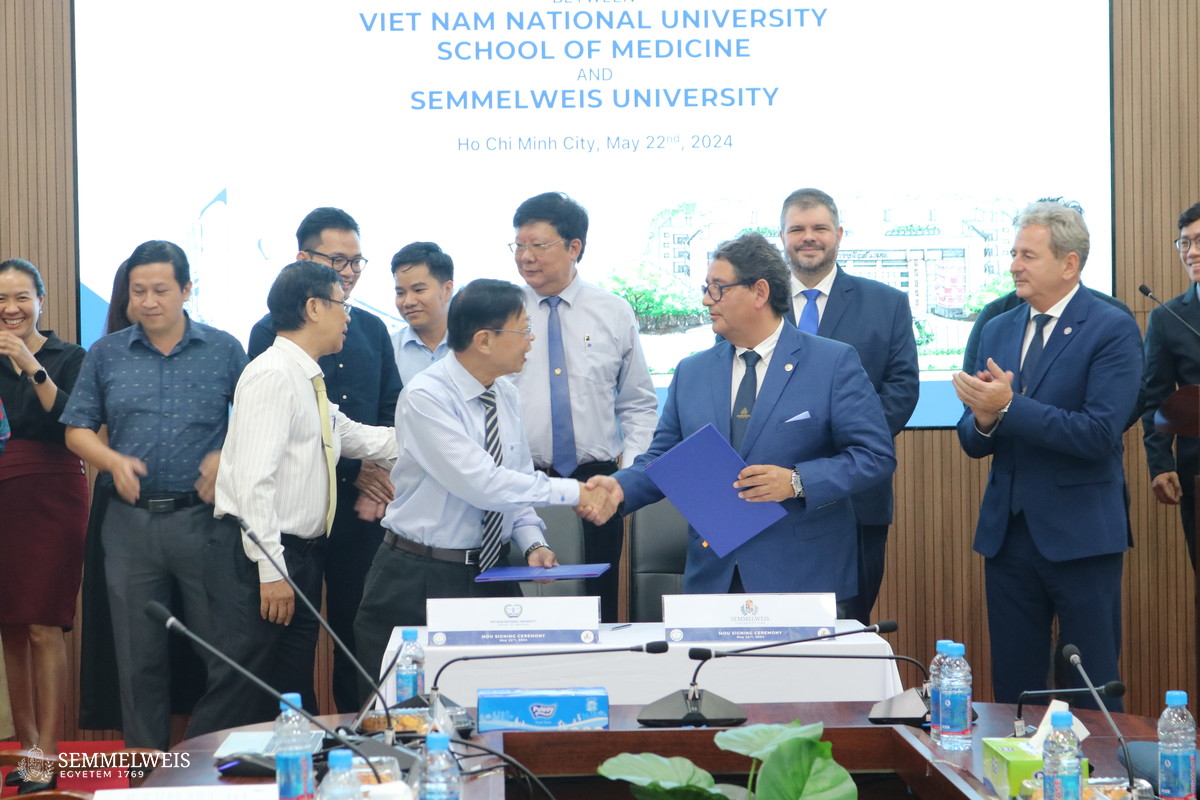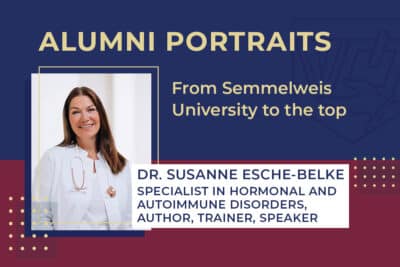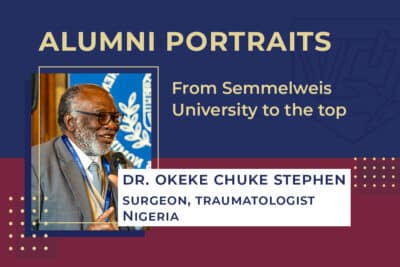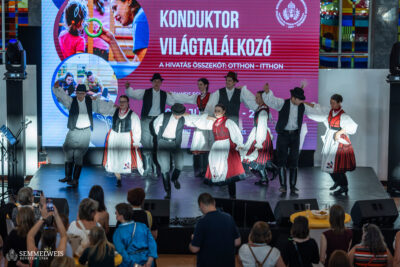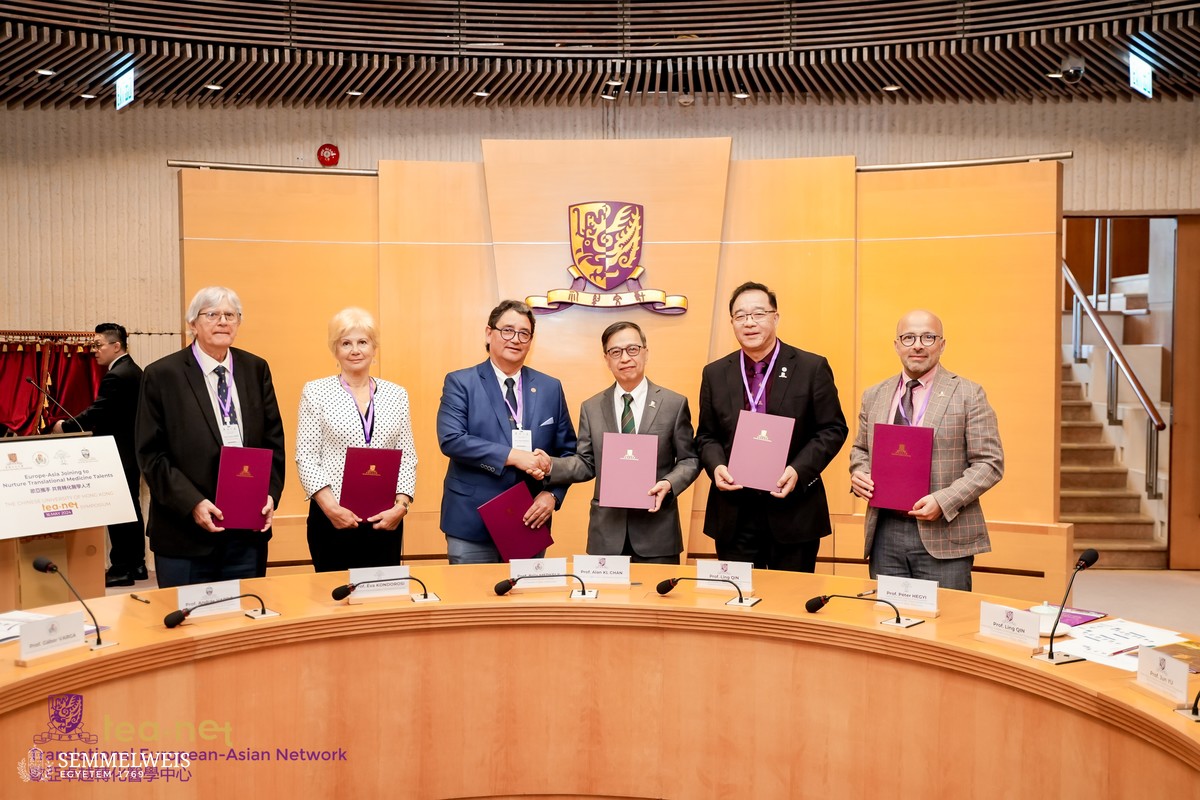 The delegation from Semmelweis University and Academia Europaea (AE) held talks in Hong Kong as well as Mainland China in the hope of future collaboration. The University was represented by Dr. Béla Merkely, Rector; Dr. Péter Ferdinandy, Vice-Rector for Science and Innovations; Dr. Péter Nyirády, future Dean of the Faculty of Medicine; Dr. Gábor Gerber, Dean of the Faculty of Dentistry; and, from the Center for Translational Medicine (TMK), Director Dr. Péter Hegyi, Deputy Director Dr. Gábor Varga, as well as Assistant Professor Dr. Rita Nagy. The delegation first met with the management of the Chinese University of Hong Kong (CUHK) in Hong Kong, where they signed a cooperation agreement, and then the directors of TEA-NET held talks with Secretary for Innovation, Technology and Industry Sun Dong at the Innovation, Technology and Industry Bureau on opportunities for cooperation and on financial resources. The next stage was Shenzhen, South China, where the members of the delegation signed a new cooperation agreement at the Shenzhen Institute of Advanced Technology, Chinese Academy of Sciences (SIAT) Symposium, and presented the program, achievements, and future plans of the Hungarian National Academy of Scientist Education (NTA) and of Semmelweis University’s Center for Translational Medicine (SE TMK).
The delegation from Semmelweis University and Academia Europaea (AE) held talks in Hong Kong as well as Mainland China in the hope of future collaboration. The University was represented by Dr. Béla Merkely, Rector; Dr. Péter Ferdinandy, Vice-Rector for Science and Innovations; Dr. Péter Nyirády, future Dean of the Faculty of Medicine; Dr. Gábor Gerber, Dean of the Faculty of Dentistry; and, from the Center for Translational Medicine (TMK), Director Dr. Péter Hegyi, Deputy Director Dr. Gábor Varga, as well as Assistant Professor Dr. Rita Nagy. The delegation first met with the management of the Chinese University of Hong Kong (CUHK) in Hong Kong, where they signed a cooperation agreement, and then the directors of TEA-NET held talks with Secretary for Innovation, Technology and Industry Sun Dong at the Innovation, Technology and Industry Bureau on opportunities for cooperation and on financial resources. The next stage was Shenzhen, South China, where the members of the delegation signed a new cooperation agreement at the Shenzhen Institute of Advanced Technology, Chinese Academy of Sciences (SIAT) Symposium, and presented the program, achievements, and future plans of the Hungarian National Academy of Scientist Education (NTA) and of Semmelweis University’s Center for Translational Medicine (SE TMK).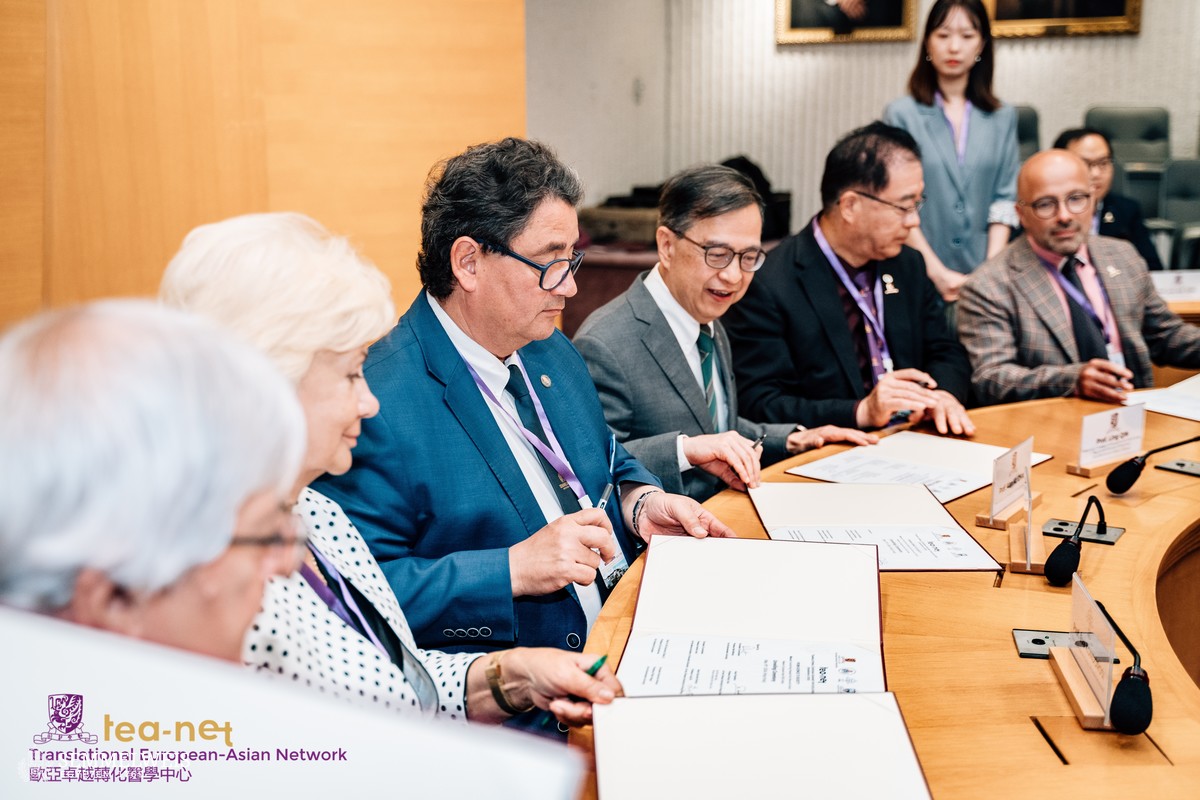 In Hanoi, Rector Dr. Béla Merkely had a meeting with the Deputy Minister of Education and Training as well as the Deputy Minister of Health of Vietnam, and he signed a cooperation agreement with the management board of Hanoi Medical School, which aims to further strengthen Hungarian-Vietnamese relations with Vietnam’s oldest medical university. The document provides a broad framework for furthering cooperation in education and science.
In Hanoi, Rector Dr. Béla Merkely had a meeting with the Deputy Minister of Education and Training as well as the Deputy Minister of Health of Vietnam, and he signed a cooperation agreement with the management board of Hanoi Medical School, which aims to further strengthen Hungarian-Vietnamese relations with Vietnam’s oldest medical university. The document provides a broad framework for furthering cooperation in education and science.
At the meeting, Dr. Béla Merkely introduced the university, touching on the previous relations with Vietnam, and made concrete proposals for cooperation. He emphasized that Semmelweis University welcomed Vietnamese students, and that nearly 30 students were currently studying in almost all of the university’s programs. He also stressed that, in addition to full-time programs, it is also possible to enroll in short-term or part-time courses and PhD programs. The rector then met with Vietnamese alumni who graduated from Semmelweis University between 1969 and 1985. In his welcome speech at the ceremony, Dr. Béla Merkely said: “Whoever studied in Hungary and graduated from Semmelweis University has a Hungarian and a Semmelweis heart. In 1969, when you started your studies, we celebrated the 200th anniversary of Semmelweis University, and it was then that our university was named after the great predecessor, Ignác Semmelweis. You made history then in 1969, just as we made history when we celebrated the 250th anniversary.” He asked the Vietnamese alumni to register in the system of the Alumni Directorate and added that he hoped to present them with golden, diamond, or sapphire jubilee degrees soon, either in Hungary or in Vietnam.
In Ho Chi Minh City, the rector signed a memorandum of understanding with the Vietnam National University School of Medicine and held talks with the general staff of Pham Ngoc Thach University of Medicine. Dr. Béla Merkely, introducing the university, emphasized the importance of the PhD program and noted that Semmelweis University welcomed students, young lecturers and researchers from Vietnam to Hungary to pursue PhD studies. He said that resources were available (through the Pannónia Scholarship Programme) to support Semmelweis University students in gaining experience abroad; he also spoke about the launch of the student exchange program. “It could be interesting for our students to study tropical diseases in the field. We also have strong links with the pharmaceutical industry, for example with Gedeon Richter Plc. in Hungary, which could provide an additional platform for cooperation,” the rector stressed. Dean Dang Van Phuoc stressed that they intended to launch a student and faculty exchange program. A memorandum of understanding was signed at the end of the meeting.
During the visit, the rector of Semmelweis University was given a comprehensive overview of the situation of healthcare-related higher education in Vietnam. In the course of the discussions, the Vietnamese partners expressed their needs and ideas concerning education, research and development, as well as medical care, both at the level of decision-makers and users. It became clear that there was a need in Vietnam for the knowledge and expertise Semmelweis University stood for, but that a careful selection process was needed to find the right academic partners. The Vietnamese government fully supports these efforts.
The Translational European-Asian Network (TEA – NET), established last year, is a joint European-Asian collaboration led by Hungary, which aims to facilitate translational research, i.e. to implement research results into clinical practice.
Image and text: Directorate of International Relations
Translation: Dr. Balázs Csizmadia
